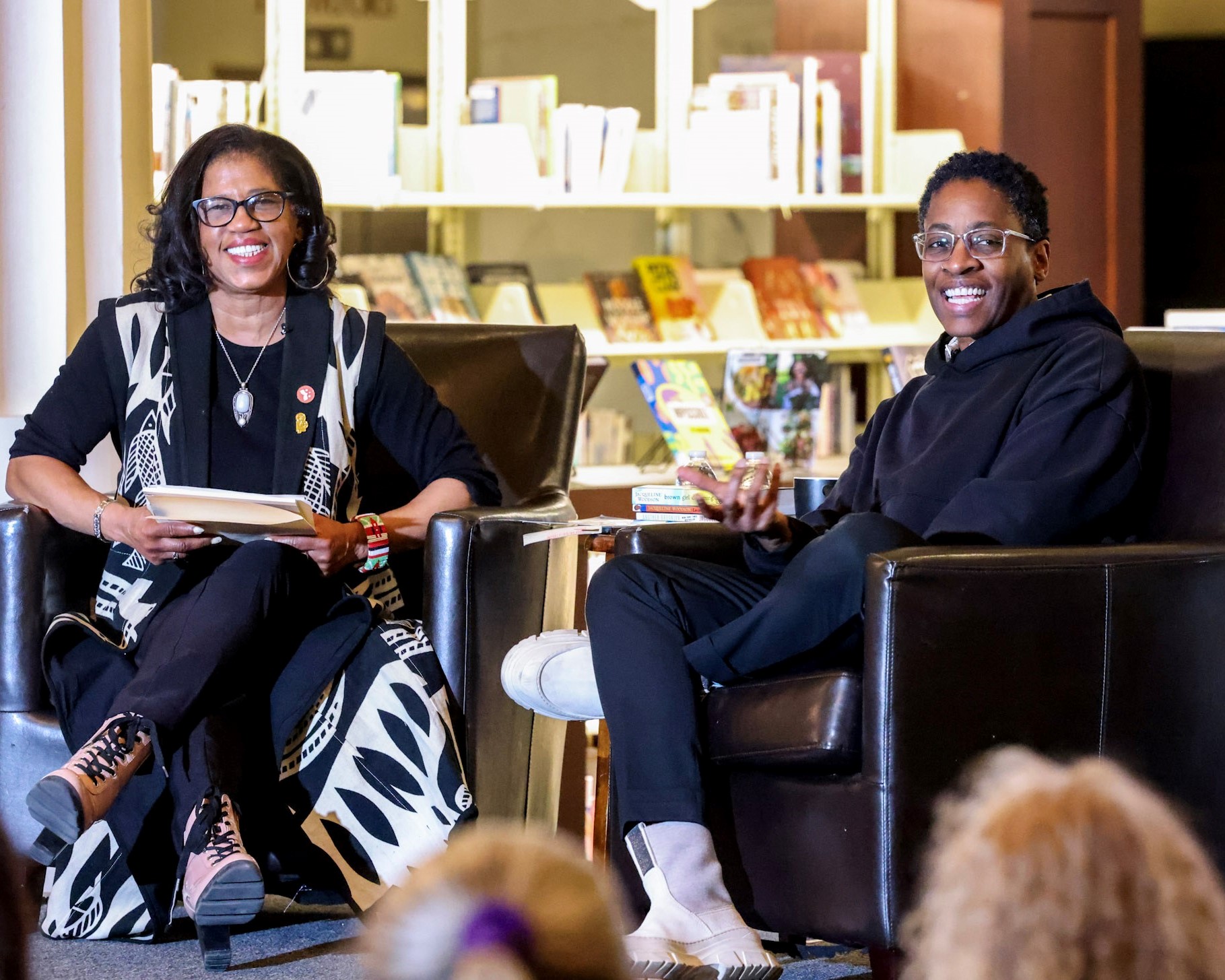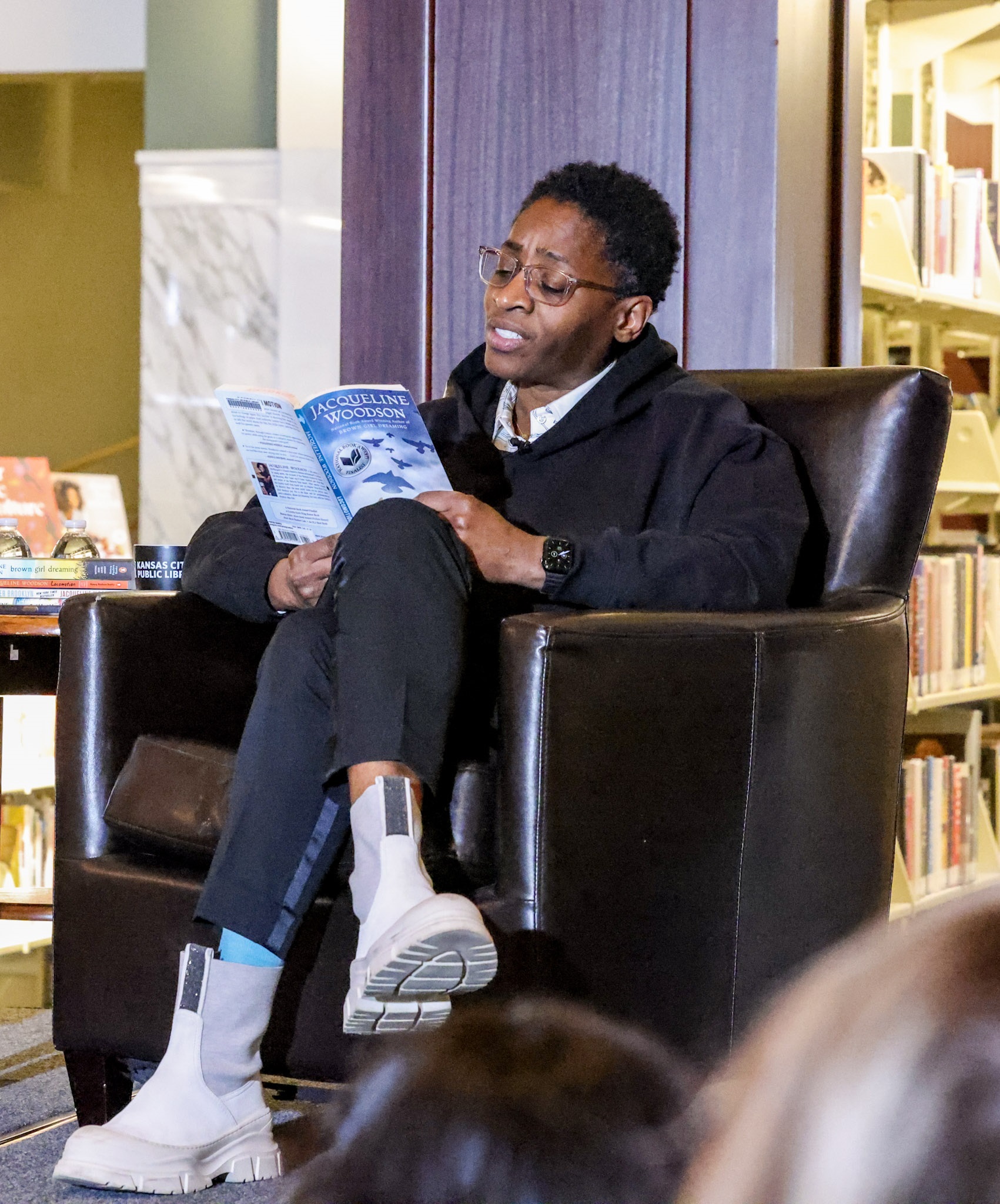Despite a Surge in Banned Book Attempts Across the Country, Author Jacqueline Woodson Stays Hopeful and Keeps Writing

This story also appeared in the April edition of Kansas City Magazine
.Jacqueline Woodson is the author of more than 30 novels for young and adult readers, as well as picture and chapter books – and she’s won numerous literary awards.
Throughout her career, Woodson has tackled challenging issues, such as child abuse, drug addiction, and racism. But some of her titles, including Brown Girl Dreaming, a memoir about growing up in the 1960s and 70s in the segregated South and Brooklyn, New York, have faced challenges or bans.
“What’s so great about literature is that it allows us to begin these conversations,” Woodson says. “And when they (readers) don't have that, you know, it just feels like their lives get so much more siloed.”
As part of the Library’s yearlong celebration of the 150th year of its founding – and timed to this year’s International Women’s Day – Woodson spoke to Mará Rose Williams, The Kansas City Star's assistant managing editor for race & equity issues, on March 8 at the Central Library about Woodson's life and career, the importance of reading, and the essential role of libraries.
Before the event, the Library caught up with Woodson by phone to ask a few questions:
What role did the library play in your life when you were growing up?
The public library played a huge role because my mom worked full time. We had to go to the library straight from school and stay there until she picked us up at 5:45 p.m. It was kind of like our after-school program, or daycare, the safe space where we were able to do our homework. And then once our homework was done, we had access to all these books. So that's kind of the foundational sense of it.
And because we didn't have a lot of books in our house, my mother always made sure we had a library card – and that we didn't have overdue books.

When you were thinking of career choices as a child – you’ve said you considered being a teacher, a lawyer, or a hairdresser, but what made you happiest was writing. What was it about writing or telling stories?
There's just such freedom to storytelling. The idea that you can create these worlds and put them on the page and engage with others through that creation.
I felt like there was a way in which my own self, my own body was legitimized through storytelling – I had this way of communicating with the world that not a lot of people did. And the world, of course, was my small community and my friends and the people who listened to my stories.
Someone could be in a bad mood, you tell them a story, and suddenly, they're laughing and forgetting that bad mood. And just the fact that those ideas came out of my head, you know, into the world, whether I was writing them or reciting them or making them up as I went along. So, I just loved the power of it.
You’ve talked about not always seeing yourself in the books you were reading. Was there one book that really struck you, or was there a kind of revelatory moment when you saw yourself or your own experience in the work?
The book that I first saw myself in the world was Stevie by John Steptoe because it was based in the city … it was just transformative in that way that suddenly here I was, here my people were, here was story on the page, and that story was an extension of my story. So, it was empowering.
And then of course Mildred Taylor's Roll of Thunder, Hear My Cry is another one. Virginia Hamilton's Zeely was one of the first books that really took me back to the South Carolina of my own childhood … stories that I read helped me see myself in the world as a writer.
In an interview that you did with NPR in 2019 when your novel Red at the Bone was released, you said, “The most dangerous thing you can do as a writer writing books that young people will read is to try to teach them something.” And instead, you said that you write because you have questions, not because you have answers.
My curiosity is manifested through the narrative … I feel like every time I write a book, it is because I have all these questions. And by the end of the book, whether or not the questions are answered, I've had a catharsis that has left me satisfied … because the narrative has taken me through the experience, I needed to go through to get to some other side of it.
And are there any questions that you're exploring right now?
There are, but I'm so superstitious about talking about my work. I know that when I talk about it, I lose the energy to write it.
In the children’s picture book called The Other Side – the copy that I had was the 10th anniversary edition – you wrote in the author’s note that when you read it to young people you “see in their faces their own eagerness to knock down the fences in their lives.”
Does it seem like that book has even more resonance today?
Yeah, it's a complicated time – and what complicates it more is that books like The Other Side are getting taken out of libraries … and watching what's happening in the world, in relation to the literature – it's a heartbreaking time.
Myself, I just keep writing, you know, just keep writing, just keep having conversations … and just keep having deep belief and faith that the young people will find their way. Because they have before. When the way has been blocked for them, they've risen up.
I mean when you look at the history of young people in the Civil Rights movement. Or when you look at the history of the young people here in New York fighting against school segregation … Or when you look at young people around the world, fighting against the climate crisis, or fighting against what’s happening in Israel and Palestine.
There are so many ways in which young people have again and again said, "Not on my watch." And I love that about them.
This interview has been edited and condensed.